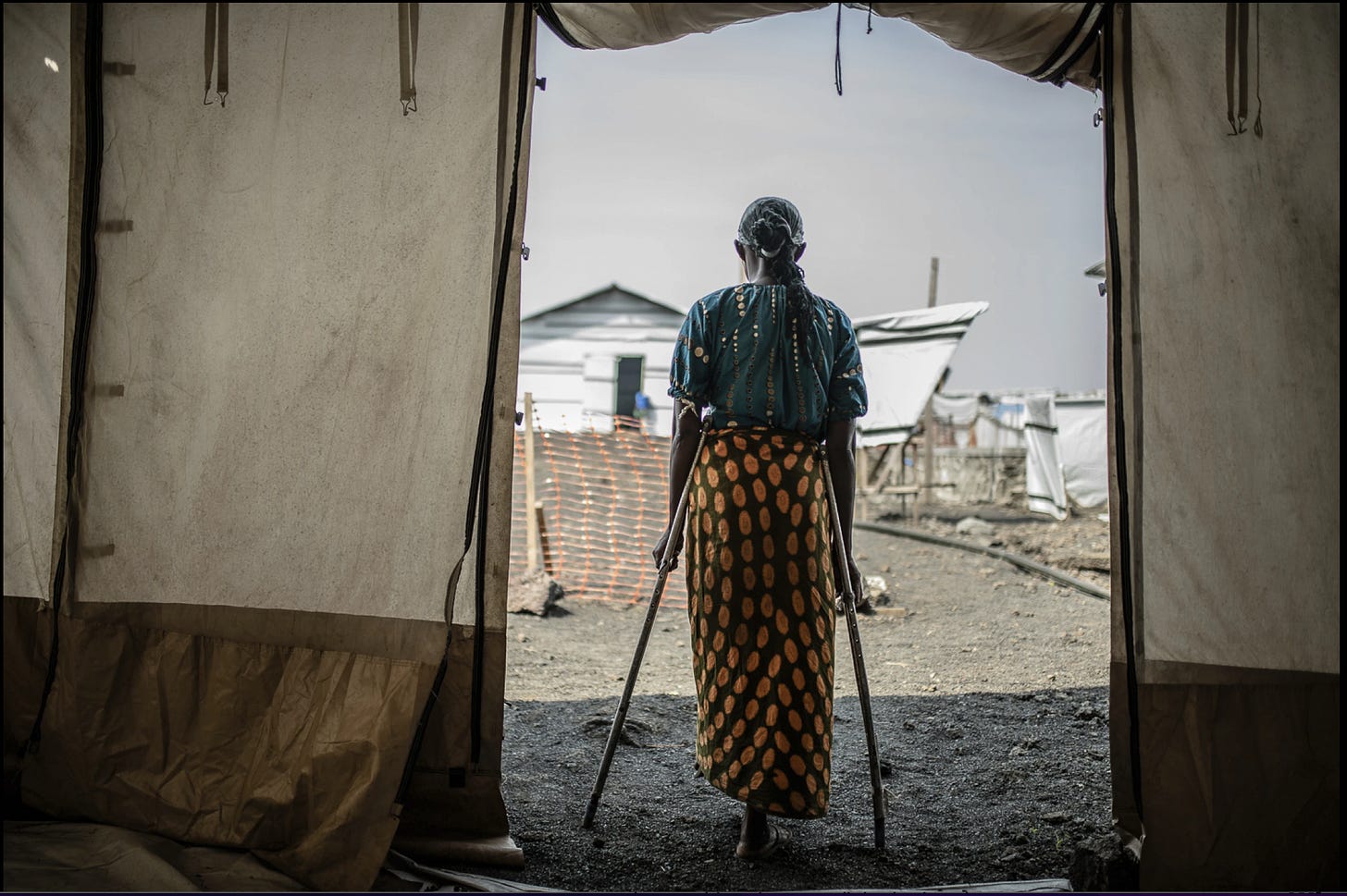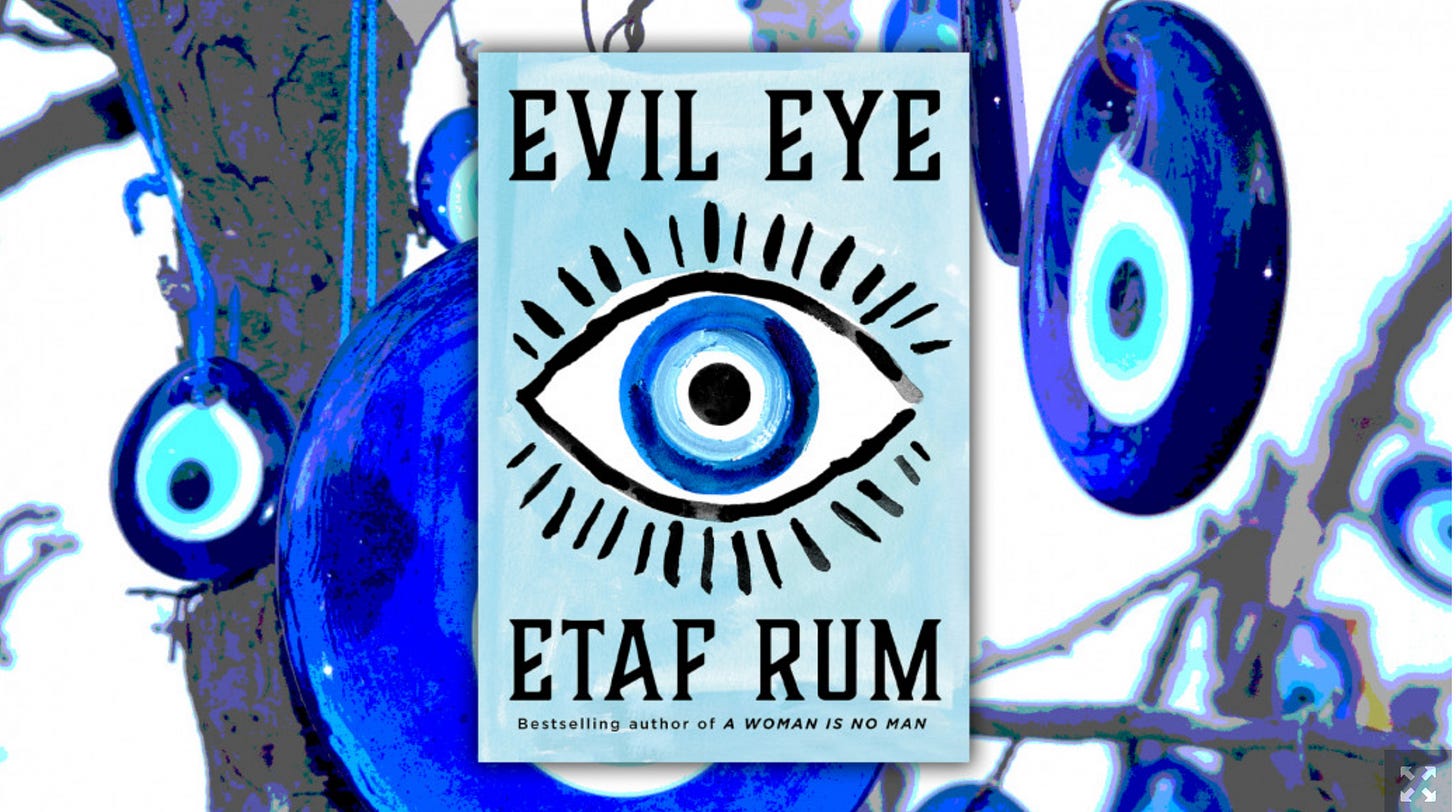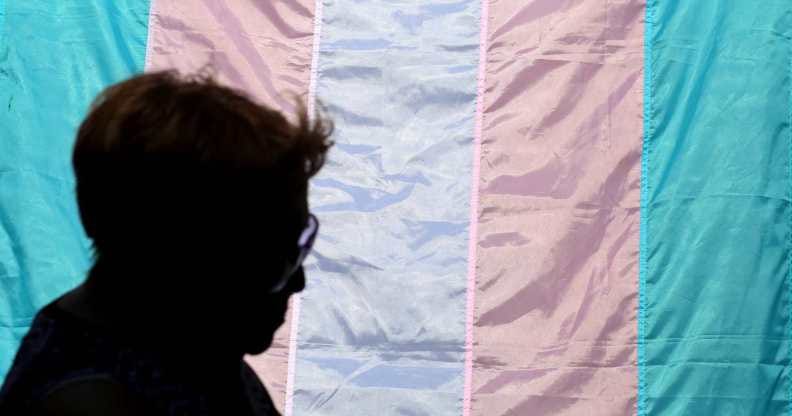Global Roundup: Congo Women in Displacement Camps, Palestinian Writer’s New Novel, Japan Supreme Court LGBTQ+ Win, Brazil Indigenous Women Collective, Kenya LGBTQ+ Community
Curated by FG Contributor Samiha Hossain
The 42-year-old mother of four who was raped in the Bulengo displacement camp where she had fled war in eastern Congo poses for a photograph August 23, 2023. AP Photo: Moses Sawasawa
CW: Rape, sexual violence
Sexual violence by armed men against displaced women is increasing rapidly in eastern Congo, as years long conflicts continue. In Bulengo and other displacement sites nearby, an average of 70 sexual assault victims each day visit clinics run by Doctors Without Borders, also known by its French acronym MSF.
Conflict has simmered in eastern Congo for nearly three decades. The United Nations estimates that more than 130 armed groups are active in the country’s northeast, vying for land or resources while some have formed to protect their communities. Sexual violence has long been used as a weapon of war by armed fighters in the region. More than 4 million people were displaced within Congo because of conflict in 2022. Of nearly 100,000 people who arrived at displacement sites near the eastern city of Goma in July, nearly 60% were women and girls, according to the International Organization for Migration.
Survivors and aid workers say displacement rips people from their livelihoods and leaves women and girls vulnerable to assault. Shelters are little more than plastic sheets, with no way of securing them from intruders. Armed men lurk outside the camp, where women and girls are forced to venture to find firewood and other necessities.
A mother of eight in a displacement camp received some medical help after she was raped. But she is still afraid, especially at night. She now arranges her children around her when they sleep, hoping their presence will deter a future aggressor. Rebecca Kihiu, MSF’s regional sexual violence activity manager, says some groups of women band together on trips outside the camp for added security, but this tactic falters if they need to split up to collect resources more efficiently.
The two women interviewed by the AP said they think each day about how they can return to farming in their village. And each night they fear for their safety.
Let the government do everything to end this war so that we can give up this life of misery. -Unnamed mother-of-four
One month has passed since the highly-anticipated release of Etaf Rum's second novel, Evil Eye. For most authors, this would be a time of celebration, but for the Palestinian-American writer, it has been a period of indescribable anguish and sorrow. Etaf Rum has been closely monitoring the unfolding events in Gaza, where Palestinians are enduring a harrowing ordeal, seemingly subjected to collective revenge by the Israeli government in response to a Hamas attack on October 7.
Evil Eye delves into the life of Yara, a young Palestinian-American woman, an art lecturer, and a mother, and the deep traumas interwoven with her family's history, dating back to the 1948 Nakba when her grandmother's home was seized in Yaffa. Etaf Rum views her current book tour for Evil Eye as an opportunity to educate her audience about Palestine and to raise awareness about the ongoing situation in Gaza.
My entire life, I've received the message that Palestine does not exist. That Palestine is somehow unreal, and by extension, so am I…I want to assert that we do exist and that these are our stories. Whether the world chooses to hear them or not, whether it acknowledges the trauma of the Palestinian people or not, this is our history, and we refuse to be erased. It is our duty to recount our stories to ensure that our history endures. That's my objective through both of my works and, hopefully, for the rest of my career. -Etaf Rum
Superstition and curses are central themes in the book, common in the Arab world. Etaf Rum explores the idea of Palestinians being cursed and how the belief in the evil eye and curses can serve as a coping mechanism when there seems to be no other explanation for the recurring catastrophes that Palestinians have endured for decades at the hands of the Israeli government.
Decades of occupation, apartheid, violence, and resilient families resisting over 70 years of settler colonialism and mass incarceration. This curse is not merely metaphorical; it manifests in very tangible ways in the lives of Palestinians, affecting everything from family dynamics to mental health. -Etaf Rum
Etaf Rum further discusses the central themes in the novel including intergenerational trauma, the dehumanization of Palestinians, motherhood, societal expectations, mental health and more. What sets this novel apart is its spotlight on the unique experiences of Palestinian American women — the dashed dreams of their mothers and grandmothers, who endured violence under Israeli occupation.
The world must awaken to our trauma and assist in our healing, and that means we must all stand unwaveringly on the side of the oppressed. To stand with Palestine is to stand with humanity. -Etaf Rum
LEONARDO MUNOZ/AFP via Getty Images
On Wednesday, the Supreme Court’s 15-strong grand bench ruled on the constitutionality of the Gender Identity Disorder Special Cases Act, after an unnamed transgender woman – who has not undergone surgery – began legal action. The decision marks the first time the Supreme Court has judged the clause unconstitutional and comes just days after a family court in the country considered a similar case.
The woman, whose identity has been withheld to protect her privacy, says she lives “socially as a woman” but is documented as a male in her family registry because she has not had surgery. The woman’s lawyers said the current law violates her right to pursue happiness and to live without being discriminated against. The 2004 legislation states that trans people must have their reproductive organs removed for the state to recognise their transition and to have the gender assigned at birth changed on their family registry. The law also says that, in order to legally transition, trans people must have a diagnosis of gender dysphoria confirmed by at least two doctors, be aged 18 or older, be unmarried and have no underage children.
The Supreme Court’s decision comes just days after a family court in Shizuoka, on the island of Honshu, ruled it was unconstitutional to require trans people to be sterilised. The ruling came after trans man Gen Suzuki filed a request in 2021 to change his gender to male on official documentation but did not wish to have surgery on his reproductive organs.
The 2019 Indigenous Women’s March in Brasília. LIAR BIANCHINI / COBERTURA COLABORATIVA VIA FLICKR
In 2015 Cristiane Julião decided to bring together Indigenous women from across Brazil to form a collective that would fight for their rights. As the National Articulation of Ancestral Warriors Women (ANMIGA) grew, it began seeking ways to amplify its members’ voices.
In 2019, the first-ever Indigenous Women’s March was held in Brasília, with more than 2,500 women from more than 130 Indigenous groups discussing and protesting the rights violations they suffer as Indigenous women. In a document they produced following the six-day event, they noted that sexism was “another epidemic brought by the Europeans” and stated that recognizing and respecting the social organization of each Indigenous group — including the importance of women, their knowledge and opinions, and the work they do — was crucial to the protection not only of Indigenous rights but to protecting the land itself.
A member of the northeastern Pankararu Indigenous group and a co-founder of ANMIGA, Julião has a master’s degree in social anthropology and has become an international advocate for Indigenous women. One of the key concerns she focuses on is the importance of women having the same rights to land tenure as men do. She discusses how FUNAI [Brazil’s Indigenous affairs agency] created the category of the male leader and women were kept in this role of “caregiver.”
It’s women who have to give birth, who have to care for, who have to raise, who have to educate, who have to feed, and have to do everything else so that men can be free to follow their paths to complete their mission as warriors, as leaders, as protectors of our land…The state needs to step up and do something about it. And the first thing it needs to do is not just listen to the men, but to the women too. -Cristiane Julião
Julião discusses how women work to reforest areas that have already been degraded, take care of the land and educate the next generation. She mentions Indigenous women leaders like Alessandra Korap Munduruku, whose campaign against the mining company Anglo American led it to withdraw 27 mineral research permits for Indigenous territories in the Amazon.
Julião calls for more effective public policies that are both feasible and practical. She says more and more Indigenous women are a part of ANMIGA now and are participating in their march, which is also getting more attention.
Our land is considered collective. We don’t want ownership. We want to be consulted when decisions are made about our land and we want to participate in its protection at all levels, including when partnering with other authorities. -Cristiane Julião
A logo of the National Gay and Lesbian Human Rights Commission of Kenya
Recently, anti-gay protests have taken place following a court ruling last month by Kenya’s Supreme Court to reaffirm the LGBTQ+ community’s right of association. Kenya’s laws outlaw same-sex relationships, but the court reaffirmed an earlier ruling that the Non-Governmental Organization Board in Kenya discriminated against LGBTQ+ people when it refused to register their association [the non-govermental National Gay and Lesbian Human Rights Commission]. Anti-gay protesters have since taken to the streets to call for the removal of judges they deem to have relaxed specific laws on LGBTQ+ rights.
Following the Supreme Court ruling, the LGBTQ+ community is pushing back even harder on these latest agitations, demanding that their rights be protected. A member of the community, who preferred to be called Samuel, said that recognizing the rights of gays and fighting against discrimination has become even more critical amid the recent anti-gay protests.
At the moment, I have gone through a lot. I have gone through stigmatization, I have gone through discrimination, and now why do you want me to turn from being gay? If you want to kill me, kill me. -Samuel
Since the anti-gay protests emerged, members of Kenya’s LGBTQ+ community have resorted to social media to share their stories, raise awareness and build support networks. They are amplifying their voices in their pursuit of equality and constitutional recognition.
Samiha Hossain (she/her) is an aspiring urban planner studying at Toronto Metropolitan University. Throughout the years, she has worked in nonprofits with survivors of sexual violence and youth. Samiha firmly believes in the power of connecting with people and listening to their stories to create solidarity and heal as a community. She loves learning about the diverse forms of feminist resistance around the world.






